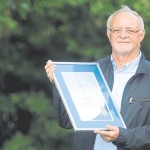Robert Tanitch reviews Natural Affection at Jermyn Street Theatre, London SW1
American playwright William Inge (1913-1973) is practically unknown in Britain, but there was a time when he was thought to be up there with Tennessee Williams and Arthur Miller. He had four Broadway hits: Come Back, Little Sheba (1950), Picnic (1953, which won a Pulitzer Prize), Bus Stop (1955) and the Dark at the Top of the Stairs (1957), which were all made into successful films.
Inge’s career was deliberately destroyed by theatre critic Robert Brustein, who loathed his old-fashioned sentimental realism. Following four flops in a row, he became convinced he could no longer write. An alcoholic all his life, his depression increased and he committed suicide. He was 60.
Natural Affection, which had the misfortune to be premiered during a newspaper strike, ran for only 36 performances in New York in 1963. Grace Wessels’ production is its UK premiere.
Inge took his inspiration from the violence he read about in the newspapers and it seemed to him that it was the terror of rejection which caused all the violence. The world can look awfully ugly at times.
A single mother, a successful business woman, is torn between her love for her lover, an unsuccessful Cadillac salesman and the illegitimate son, she rejected and who has just been released from reform school.
Natural Affection is well worth reviving and it is well acted. Lysette Anthony is the mother, Timothy Knightley is the lover and Louis Cardona is the son with an unhealthy fixation on his mum. The actors are not cowed at all by the hysterical melodrama in the second act and embrace it.
 Inge cannot resist a little joke. The characters in the play, when they go to the theatre, want to see musicals. They don’t want to see plays by Tennessee Williams, arguing they are the product of a “diseased mind.” They do not realize that they themselves could be characters in a Tennessee Williams play.
Inge cannot resist a little joke. The characters in the play, when they go to the theatre, want to see musicals. They don’t want to see plays by Tennessee Williams, arguing they are the product of a “diseased mind.” They do not realize that they themselves could be characters in a Tennessee Williams play.
It was while he was drama critic on the St Louis-Times in the 1940’s that he met (and slept with) Williams, who took him to see The Glass Menagerie, which Inge thought was the finest play he had seen in years and which inspired him to become a writer.
To learn more about Robert Tanitch and his reviews, click here to go to his website




